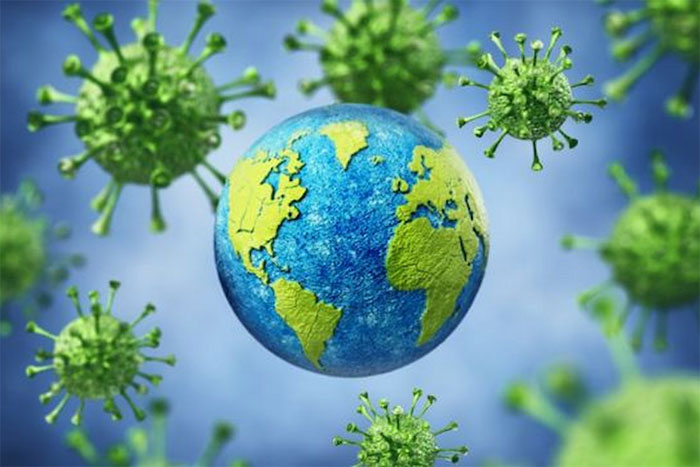The Covid-19 pandemic seems to be evolving in complex ways and will continue to do so. However, living with Covid-19 does not mean we will give up and allow it to spread uncontrollably.
Last week, the Centers for Disease Control and Prevention (CDC) in the United States issued new guidelines regarding mask-wearing for fully vaccinated individuals, recommending that people living in high-risk areas wear masks in public places. This move came after the CDC gathered data on the Delta variant, which is the predominant strain in the majority of recent infection chains. The collected data indicates that even individuals who have been vaccinated and have antibodies can still carry the virus and infect others.

Even if you have been vaccinated against Covid-19, you should still wear a mask. Photo: Ed Jones (Getty Images)
All these recent findings compel us to consider: Can we still control the Covid-19 virus before it reaches a level of infection affecting the entire human population? And if we cannot, how will we live with it?
Vaccines help reduce the spread and damage caused by the virus, but they are not a perfect solution
Before the CDC released data in its new guidelines, the Washington Post published an internal document from the CDC on this issue. Based on available data, including information from recent outbreaks involving vaccinated and unvaccinated individuals in Massachusetts, the CDC confirmed that the Delta variant is not only capable of spreading faster than the strains that caused outbreaks last year, but it is also more transmissible than other notorious infectious diseases, such as chickenpox.
However, individuals who have received mRNA vaccines (Pfizer, Moderna) still have a high likelihood (about 80%) of resisting the Delta variant and a very high chance of reducing severe symptoms (up to 90%). Nevertheless, the CDC currently suspects that vaccinated individuals who become infected could produce levels of the Covid-19 virus equivalent to those who are unvaccinated. If this possibility occurs, it would indicate that vaccinated individuals can still transmit the virus to others. Overall, an important point is that vaccinated individuals seem to be less likely to spread the disease because they have been protected against the Covid-19 virus from the outset.
These conclusions have not yet been firmly established. Some other countries, like the UK, estimate that the basic reproduction number (R0) of the Delta variant is lower than the figure provided by the CDC. Some scientists have questioned whether the transmissibility of vaccinated individuals, as stated by the CDC, is exaggerated based on PCR test results. And an important point to reiterate is that vaccinated individuals still have superior metrics compared to unvaccinated individuals in many respects – even having an 8-fold lower risk of contracting the Delta variant. According to CDC analysis, the rates of severe symptoms and mortality have also been significantly reduced.
However, it can be said that the urgency of the Delta variant and other concerning variants has led many scientists to doubt the ability to control the epidemic situation and recover.
Covid-19 will continue to spread, but vaccines will help control it
Even when the first vaccine doses were released to the market at the end of 2020, researchers, along with the World Health Organization (WHO), made efforts to warn that vaccines alone could not end the Covid-19 pandemic. Just last week, U.S. government scientists reported that about one-third of white-tailed deer in some states have antibodies against the Covid-19 virus. However, these individuals showed no symptoms when discovered, so there is no need for excessive concern about this finding. But through this, we can understand that the coronavirus still has many ways to continue its lifecycle.
In February 2021, the journal Nature conducted a survey of over 100 immunologists, infectious disease experts, and virologists studying coronaviruses. Nearly 90% of experts agreed that it is likely or very likely that Covid-19 will become endemic, meaning it will always appear in the community to some extent. While some researchers still propose the idea of Zero Covid – eliminating cases from a specific area – the majority still agree that Covid-19 will certainly continue to cause illness in people regularly, similar to other endemic diseases like seasonal flu and common cold viruses.
Of course, the concerns behind this are not simple. Becoming an endemic disease does not make Covid-19 any less dangerous than it is now. Malaria is endemic in tropical regions of the world and continues to be a leading cause of death, with over 430,000 deaths worldwide in 2017 alone. This shows that even in the absence of vaccines (at least currently), we can still reduce the spread and risk of death from malaria in recent years through control and extermination programs for disease-carrying insects. Other easily transmissible endemic diseases, like chickenpox, have also decreased in the U.S. thanks to high vaccination rates. And ideally, using vaccines to reduce the spread of disease could still apply to Covid-19.

Higher vaccination rates will help control the disease, leading to fewer community infections.
We need to buy time to increase vaccination rates
As more people around the world become vaccinated against the Covid-19 virus, including the Delta variant and other more concerning variants, the risk of death or severe symptoms will significantly decrease compared to the nearly two years prior. Higher vaccination rates may not completely stop the spread of the virus, but they will help control the epidemic, leading to fewer community infections. This control will give us more time to respond to scenarios involving new variants that may emerge with better concealment capabilities, worsening conditions, and potentially higher mortality rates among vaccinated individuals (though difficult, it is still a possibility). Fortunately, such scenarios have not yet emerged.
Currently, the global vaccination rate has only reached 28% for one dose and 14% for two doses. In the U.S., there are still significant gaps in vaccination rates among children, leading to the potential for widespread transmission of the Delta variant. Last Thursday (July 29), the U.S. recorded the highest number of infections in the world once again – a shocking anomaly during the pre-vaccination period. Hospitalization and mortality rates were expected to gradually decrease from the peak of the outbreak in early 2021, but these figures have risen again. As before, patients will continue to suffer unnecessarily.
It is quite understandable that those who have been vaccinated are concerned about the increased risk of infection from the Delta variant and the potential to spread it to others. This highlights the necessity for booster shots. While a third dose of the vaccine may be needed—especially for vulnerable populations such as the elderly or those with weakened immune systems—the barrier to combating Covid-19 is not the vaccine itself, but rather the diseases that have not been previously exposed to or vaccinated against. We have yet to achieve herd immunity, especially on a global scale, despite many media outlets promoting it since last year. Even as the Delta variant spreads rapidly in the United States after wreaking havoc in the UK and India, there is no certainty that Covid-19 will cease after this wave.
The latest wave of the pandemic has underscored the urgent task of widespread vaccination. The U.S. does not seem to prioritize this as a national mission (possibly due to the inability to ensure implementation), but an increasing number of private and public enterprises are moving towards achieving this goal. However, if only businesses participate in this effort, only a portion of the population will be vaccinated. Therefore, collaboration among various stakeholders is essential to increase the Covid-19 vaccination rate.

If the majority of the global population is exposed to Covid-19, it does not mean that everything will spiral out of control. We can still mitigate the impact of this wave of infection and future waves through measures such as wearing masks and sanitizing. When the virus spreads at a low rate, simple measures like staying indoors when sick and wearing masks outdoors can help prevent transmission.
The slower we spread the virus, the more time we have to vaccinate the entire population—from immunizing children to administering third doses to high-risk groups. Covid-19 may continue to exist, but its harmfulness will depend on our actions.


















































